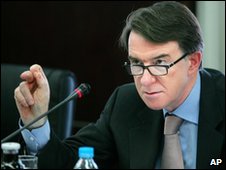|
By Jonathan Fildes
Technology reporter, BBC News
|


The firms fear the clause will give future governments too much power
|
Some of the biggest names on the web have written to Peter Mandelson to express "grave concerns" about elements of the Digital Economy Bill. Facebook, Google, Yahoo and eBay object to a clause that they say could give government "unprecedented and sweeping powers" to amend copyright laws. "We urge you to remove Clause 17 from the bill," the letter read. However, the government has said it believes the clause will "future-proof online copyright laws". "The law must keep pace with technology, so that the Government can act if new ways of seriously infringing copyright develop in the future," a spokesperson for the Department for Business, Innovation and Skills (Bis). The consortium believe that if Clause 17, as it is known, is approved it will give "any future Secretary of State" the ability to amend copyright laws as they see fit.
 |
DIGITAL ECONOMY BILL
Legal framework for tackling copyright infringement via education and technical measures
Ofcom given powers to appoint and fund independently funded news consortia
New duties for Ofcom to assess the UK's communications infrastructure every two years
Modernising spectrum to increase investment in mobile broadband
Framework for the move to digital radio switchover by 2015
Updating Channel 4 functions to encompass public service content, on TV and online
Age ratings compulsory for all boxed video games aimed at those over 12 years
|
"This power could be used, for example, to introduce additional technical measures or increase monitoring of user data even where no illegal practice has taken place," the letter read. This would "discourage innovation" and "impose unnecessary costs" representatives of the firms wrote. Others have suggested that the clause could be used to tweak laws so that search engines could not publish summaries of news stories in their results. Bis said that clause 17 was a necessary extension of its plans to reduce copyright theft and that fears that government would mould copyright laws to their needs were unfounded. "Business will not wake up one morning to a world in which government has taken extensive digital powers," the spokesperson said. "There are substantial constraints on how the power can be used, with requirements for a consultation and votes in both houses of Parliament before anything can happen." However, the consortium of companies say the clause is so broad ranging that it could risk "legitimate consumer use of current technology as well as future developments".
 |
READ THE LETTER
Most computers will open PDF documents automatically, but you may need Adobe Reader
|
"We all acknowledge that new business models need to emerge to support creative content," the letter from European and UK representatives of the firms reads. "They are inherently risky and entrepreneurs rely heavily on there being a consistent and stable approach to copyright enforcement. "This clause would inject an unprecedented level of uncertainty in this regard." Other groups including US digital rights group The Electronic Frontier Foundation have objected to it. Clause 17 is part of the government's Digital Economy Bill, outlined in the Queen's speech in November 2009. The bill includes a shake-up of the radio spectrum, a classification system for video games and plans to tackle illegal file-sharing. The so-called "three strikes" element of the bill would give regulator Ofcom new powers to disconnect persistent net pirates. The plans have proved controversial with lobby organisation The Open Rights Group urging people to contact their MP to oppose the plans. The bill will have its second reading in the House of Lords on 2 December. It will have to go through various other readings and drafts before it becomes law.
|

~RS~q~RS~~RS~z~RS~15~RS~)

~RS~q~RS~~RS~z~RS~15~RS~)
Bookmark with:
What are these?